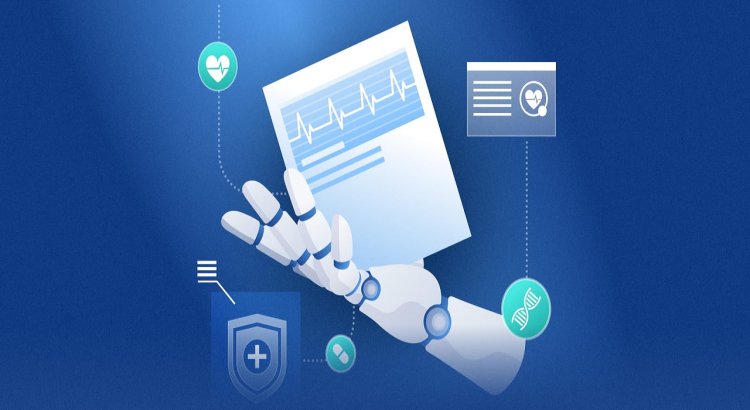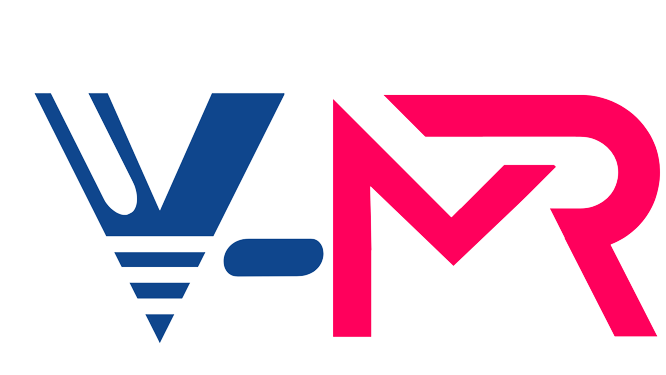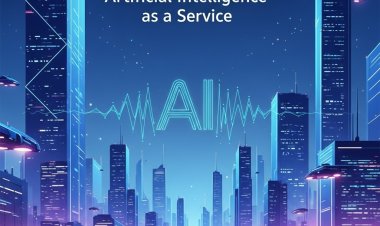How Generative AI is Transforming Healthcare | Diagnostics & Treatment
Discover how generative AI is revolutionizing healthcare by improving diagnostics, enhancing treatment options, and personalizing patient care. Learn its applications and benefits.

How Generative AI is Transforming Healthcare: Revolutionizing Diagnostics and Treatment
Introduction
Generative AI is revolutionizing healthcare, offering groundbreaking advancements that enhance diagnostics and treatment delivery. This cutting-edge technology leverages machine learning to analyze complex patient data, improving accuracy, efficiency, and personalized care. Its ability to automate and augment decision-making processes is reshaping healthcare systems globally.
In this blog, we’ll explore the transformative impact of generative AI, delving into its applications in diagnostics and treatment, the benefits it offers, and the challenges that need to be addressed for its seamless adoption in healthcare.
Order a sample PDF of the Generative Artificial Intelligence (Gen AI) in Healthcare Market Intelligence Study, published by Vantage Market Research.
What is Generative AI in Healthcare?
Generative AI refers to advanced algorithms capable of creating new data or insights based on the input it receives. Unlike traditional AI, which focuses on analyzing and categorizing existing data, generative AI goes a step further by producing new, meaningful outputs. In healthcare, this includes generating diagnostic insights, simulating treatment scenarios, and creating personalized care strategies.
Applications of generative AI in healthcare encompass:
- Processing medical records to identify patterns in patient histories.
- Enhancing imaging technologies to improve diagnostic accuracy.
- Personalizing treatments by analyzing genetic, lifestyle, and environmental factors.
This capability allows generative AI to streamline workflows, enhance clinical decision-making, and ultimately improve patient outcomes.

Key Applications of Generative AI in Diagnostics
Improved Disease Detection
Generative AI has transformed disease detection by analyzing vast datasets, including medical imaging, lab reports, and genetic profiles. It excels at identifying patterns and anomalies that may be missed by human observers.
For instance, AI-powered tools can detect early signs of cancer from imaging scans with a high degree of precision, often outperforming traditional diagnostic methods. Similarly, neurological disorders, such as Alzheimer’s or Parkinson’s, can be detected earlier by analyzing subtle changes in imaging data or patient behavior patterns.
Predictive Analytics for Early Diagnosis
Predictive analytics is another area where generative AI shines. By analyzing longitudinal health data, these models identify trends that signal potential risks.
For example, AI can predict the onset of diabetes or cardiovascular diseases by detecting patterns in a patient’s blood sugar levels, cholesterol, and lifestyle habits. Early detection allows for preventive measures, reducing the likelihood of severe complications and associated healthcare costs.
AI-Powered Medical Imaging
Generative AI significantly enhances medical imaging technologies such as CT scans, MRIs, and X-rays. These AI algorithms:
- Improve image resolution, making it easier to identify subtle abnormalities.
- Automate the detection of diseases like fractures, tumors, or infections.
- Reduce the time required for analysis, allowing healthcare providers to make quicker decisions.
By streamlining the imaging process, generative AI enables radiologists and clinicians to focus on patient care, improving diagnostic accuracy and efficiency.
Enhancing Treatment with Generative AI
Personalized Medicine
One of the most significant contributions of generative AI is its ability to tailor treatments to individual patients. Personalized medicine involves creating therapies based on a patient’s:
- Genetic profile.
- Medical history.
- Lifestyle and environmental factors.
Generative AI analyzes these datasets to design treatment plans that optimize efficacy while minimizing side effects. For example, AI-driven drug selection for cancer patients ensures that the chosen therapy aligns with their genetic makeup, improving recovery outcomes.
Clinical Decision Support Systems (CDSS)
Generative AI enhances clinical decision-making through advanced support systems. CDSS tools analyze extensive datasets, including patient records, medical literature, and clinical trial results, to provide data-driven treatment recommendations.
These systems:
- Help clinicians identify the most effective treatment protocols.
- Minimize errors by validating decisions against a database of evidence-based practices.
- Save time by automating complex analyses, enabling healthcare providers to focus on patient interaction.
Accelerating Drug Discovery
In pharmaceutical research, generative AI plays a crucial role in accelerating drug discovery. By simulating molecular interactions and predicting drug efficacy, AI reduces the time and cost of bringing new therapies to market. This is particularly valuable for addressing urgent health crises, such as the COVID-19 pandemic, where rapid vaccine development was critical.
Benefits of Generative AI in Healthcare
The adoption of generative AI in healthcare offers numerous advantages:
Enhanced Diagnostic Accuracy
AI’s ability to process and interpret massive datasets improves the accuracy of diagnoses, reducing human error and ensuring early disease detection.
Increased Efficiency
By automating repetitive tasks, generative AI allows healthcare providers to focus on complex decision-making and patient care, enhancing productivity.
Cost-Effective Solutions
Early diagnosis and tailored treatments prevent complications and reduce the need for extensive interventions, ultimately lowering healthcare costs.
Improved Patient Outcomes
By delivering precise and personalized care, generative AI contributes to faster recovery rates and better overall health outcomes for patients.
Global Accessibility
Generative AI has the potential to bridge healthcare gaps in underserved regions by providing diagnostic tools that require minimal infrastructure, such as mobile-based AI applications.
Challenges of Generative AI in Healthcare
Despite its transformative potential, generative AI faces several challenges that must be addressed for widespread adoption:
Data Privacy and Security
Healthcare data is highly sensitive, and ensuring its security is paramount. Generative AI systems must comply with strict regulations like HIPAA and GDPR to protect patient privacy.
Ethical Concerns
The use of AI raises ethical questions, such as:
- Potential biases in AI algorithms that could lead to unequal treatment.
- Ensuring that AI recommendations align with human values and medical ethics.
Regulatory Hurdles
Stringent regulatory frameworks often delay the approval and implementation of AI tools in clinical settings. Balancing innovation with patient safety is a key challenge.
Integration with Existing Systems
Healthcare institutions must invest in infrastructure upgrades and staff training to integrate AI technologies effectively, which can be resource-intensive.
Dependency on High-Quality Data
AI models require large volumes of high-quality, diverse datasets to function accurately. Limited access to such data can hinder AI’s performance, particularly in regions with underdeveloped healthcare systems.
The Future of Generative AI in Healthcare
As generative AI continues to evolve, its applications in healthcare will expand. Future developments may include:
- AI-driven virtual assistants for remote patient monitoring and consultations.
- Advanced predictive models for real-time health monitoring and disease prevention.
- Integration with wearable devices to provide continuous health insights.
The ongoing collaboration between technology developers, healthcare providers, and regulators will be crucial in realizing the full potential of generative AI.
Gather more insights about the market drivers, restrains and growth of the Global Generative Artificial Intelligence (Gen AI) in Healthcare Market
Conclusion
Generative AI is transforming healthcare by revolutionizing diagnostics and treatment. From improving disease detection to enabling personalized medicine, its impact is profound and far-reaching. While challenges such as data privacy and regulatory barriers exist, the benefits of generative AI—enhanced accuracy, efficiency, and patient outcomes—make it a vital tool for the future of healthcare.
As this technology advances, its role in shaping a more efficient and patient-centered healthcare system will only grow. For a deeper understanding of market trends, key players, and regional dynamics, explore the comprehensive Generative AI in Healthcare Market report by Vantage Market Research.


















